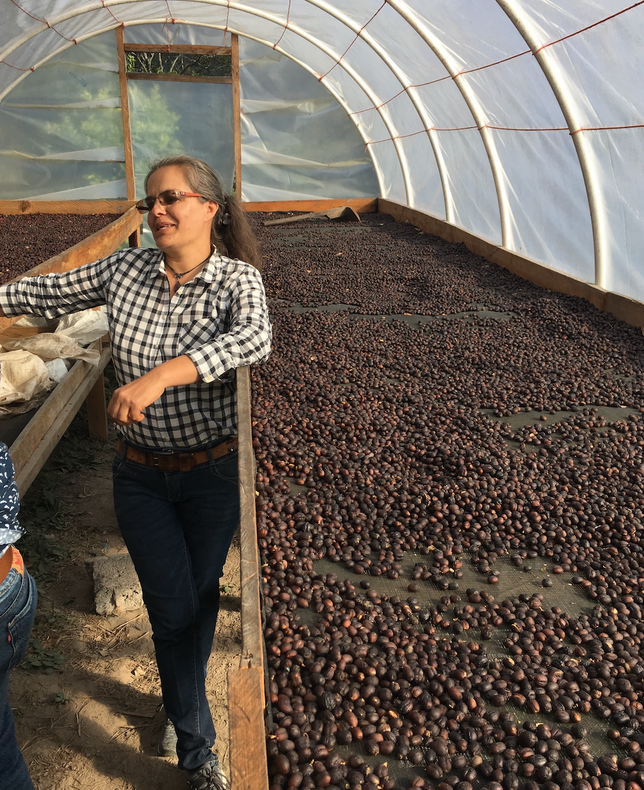In 2018 a few of us had a chance to go to the mountains of Honduras and visit one of COMSA's pioneering coffee farmers-- Miriam Beté Perez. Her farm was one of the most beautiful well-run operations that we have seen in Central America. Miriam is not only one of the original farmers in the organization, she has consistently been recognized for her high-quality coffee, high annual yields, and innovative organic production practices. We recently caught up with her to talk about her experiences as a coffee farmer and, in particular, as a woman who has succeeded in a traditionally male-dominated industry.
Sweetwater: How long have you been growing coffee? How did you start?
Miriam Beté Perez: I have been growing coffee for 29 years. I started growing coffee with my grandfather, I am the third generation of my family growing coffee.
SW: When we visited you, I remember that many of your relatives were involved in your farm. What is it like to work with your children growing coffee?
MP: Since they were little, my children accompanied me to the coffee farm, especially when they were on vacation from their school. I taught them to harvest coffee, and to participate in all the work of cultivating the crop, just as my grandfather taught me. The most important thing for my children to understand is the world of coffee, so I prioritized that they study in a bilingual school and especially that they learn the English language. This is how we founded Marcala Bilingual School, now COMSA International School. I thought that in the business world, knowing how to communicate with customers is the best thing to do to do business. The other important thing about coffee is learning about coffee quality, so there my daughter studied coffee cupping and barista arts. She is now at university studying marketing. Lastly, taking care of the environment and handling the administration of the business is what two of my children are studying. So working with my children in coffee is preparing a team from childhood, so that they are responsible adults, with knowledge about producing, processing, serving customers at the Clave de Sol café, selling products locally and exporting coffee internationally.
SW: You produce some of the best coffee at COMSA (we've bought some of your lots in the past!). What are some keys to producing excellent coffee?
MP: Do organic, pranic and biodynamic agriculture. Put into practice the protocol of the Clave del Sol farm in the coffee process, from the harvest to the preparation of the coffee for export and/or sale in the café. Training, empathy, good treatment, and payment of a minimum wage to workers. I have passion and dedication for what I do.

SW: Coffee has long been seen as "men's work" throughout the industry. Has it been difficult to make your mark in the industry as a woman?
MP: Yes, it is difficult since we live in a culture of patriarchy– a system that favors machismo. In any case, there are rebellious and strong women who dream of the possibility that another, more humane world is possible.
SW: Are there many women producers in COMSA? Do you see more women today than when you started?
MP: Yes, now there have many women producers in COMSA. When I was a girl in Marcala, only one woman drove a car! Today there are many women who drive cars and we have many women who run farms.
SW: Climate change is profoundly affecting coffee cultivation. How are you and other COMSA farmers fighting the effects of climate change?
MP: We put COMSA's philosophy into practice: The 5 M's– make soil and more soil.
M : Organic Matter
M : Minerals
M : Living Molecules
M : Mountain microorganisms
M: Gray Matter. Think, analyze, investigate, innovate.
We have an organic agriculture movement called: Pata de Chucho. The slogan is: Even with waste, there is no harvest that is lost.

Thanks to Miriam Perez for taking the time to answer our questions and for all of the incredible coffee she has shared with us over the years. We will be aiming to get some more of her coffee into Sweetwater after the end of the 2022 harvest. Until then, you can find COMSA coffee in our Deep Roots Blend. Cheers!

